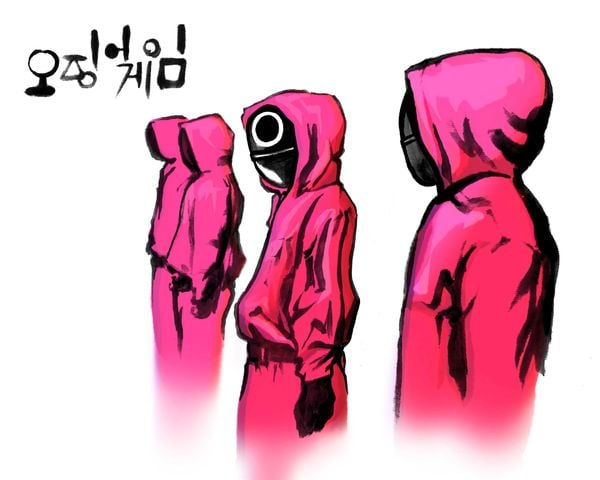On track to becoming Netflix’s biggest show ever, “Squid Game” leaves viewers unsettled but locked in, immersed in its eerie premise. Written by South Korean director Hwang Dong-hyuk, the recent release’s overnight virality follows the increasing popularity of South Korean films in America, most notably demonstrated by “Parasite” (2019) and “Train to Busan” (2016)
The show’s unprecedented success likely boils down to its refreshing spin on the dystopian genre and its topical storyline, which has created a psychological thriller that plays on the real horrors of capitalist society.
Seong Gi-Hun, the main character of “Squid Game,” is a deadbeat, divorced gambler who is in debt to loan sharks and leeches money off his mother to get by. At the height of his desperation, he is approached by a man at the subway station who offers him the chance to join a game to win money — a lot of it. Eventually, he agrees and finds himself on an isolated island with 455 other participants, each in desperate need of money. The reality of their situation is soon revealed: the games they play are simple, but their lives are at stake. In a deadly version of the childhood game “Red Light, Green Light,” players are killed left, right and center as panic ensues.
What separates “Squid Game” from similar dystopian, fight-to-the-death game show narratives is that players can end the game at any time with a majority vote. After the first game, the players take a vote, which surprisingly results in a decision to leave. Everyone returns to their lives, free from the nightmarish imprisonment that leaves as fast as it came. But as we follow a few of the contestants, we see that life outside the game is as brutal as it is inside. Most players return to the game, realizing that they would rather risk their lives than live in the real world. As horrifying as it may seem, the game is not antagonistic, as often portrayed in most works of dystopian literature. Instead, the game is an escape from the real nightmare of everyday life.
“Squid Game” also stands out for its creative use of visual and auditory elements to reinforce its messages. During “Red Light, Green Light,” we see the first explicit mention of the two colors that become recurring motifs. The players, all having fallen into debt, wear green tracksuits, while the game workers wear dark pink. These two colors haunt the players even after they leave — red and green traffic lights are shone on their faces — a reminder that life on the outside is as brutal as within the game.
Emphasizing themes of classism, the show leans on classical music to highlight the game’s irony. During episode seven, a group of wealthy individuals watches the players fighting for their lives as a source of entertainment while lighthearted melodies play in the background. The contradiction between the beauty of the show’s musical score and the horror of its storyline makes a sharp commentary on society’s acceptance of financial inequality.
The series not only condemns the inequalities of capitalist society, but also the dangers of internalized capitalism and how cutthroat competition can bring out the worst parts of human nature. It disturbs us because it shows us how cruel people can be when their lives or, more importantly, their families and pride are on the line.
“Squid Game” is a thrilling experience that hooks the viewer from the start and never lets go. While not without flaws, it deserves much of the hype that it has received. The show stands out because it is so much more than simply a warning about the dark side of capitalism. “Squid Game” brings the problem of inequality into the spotlight, and its horror catalyzes viewers to consider how we can make the world a more equal place and dismantle the mindset of internalized capitalism. At the very least, viewers learn not to trust strangers on the subway.
